
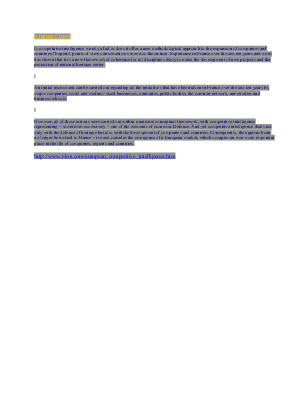
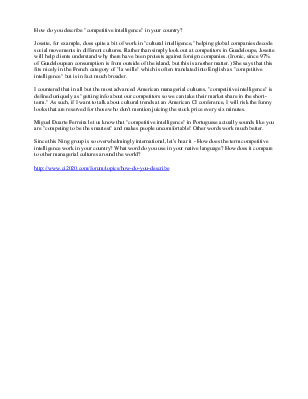
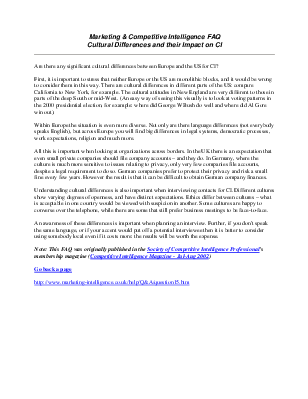
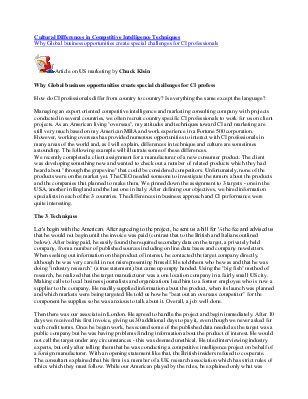
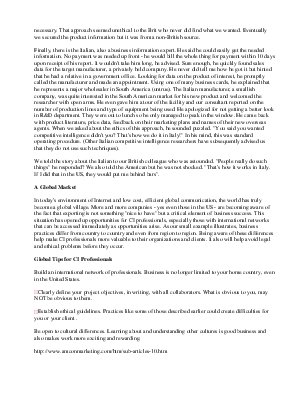
Competitive Intelligence in business
CI has developed in different ways in different countries. It would be interesting to evaluate the ways CI has evolved and assess whether this is because of cultural reasons, government support, or possibly national reasons such as defeats in war. The Japanese, for example, created a significantly sophisticated approach to competitive intelligence after the Second World War. China has purportedly the fastest growing community of CI professionals. So there are research opportunities for international studies and nationally how can the UK stimulate similar approaches at a strategic national level?
Business information and competitive intelligence are crucial for companies seeking competitive advantage. But what are the ethical constraints that affect the behaviours of individual staff, groups of employees and are these subtly informed by the views of senior management? These may differ significantly by country and culture. An extensive research project looking at what professional associations, such as the Society of Competitive Intelligence Professionals (SKIP), government legislation and internal company guidance documents advise, limit and proscribe concerning ethical behaviours could inform debate about the moral maze individuals in business find themselves in. Will the recent recession make adhering to ethical guidelines easier or more difficult? Does ethical behaviour pay-off long term in regards to employee sense of worth, enhancing brand and company reputation and image or will short-term gain always be more appealing? This is a research area which can be discussed with staff in the department to arrive at agreed foci to suit an individual researcher.
http://www.lboro.ac.uk/departments/ls/studying/Staff%20topics/dstephens.html
NTRODUCTION
Is competitive intelligence merely a fad or does it offer a new methodological approach to the expansion of companies and countries? Experts’ points of view can sometimes seem too theoretical. Experience in France over the last ten years and more has shown that it is a new framework of coherence for all disciplines likely to make the development of new projects and the protection of national heritage easier.
An initial assessment can be carried out regarding all the initiatives that have been taken in France over the last ten years by major companies, small and medium-sized businesses, ministries, public bodies, the consular network, universities and business schools.
However, all of these actions were carried out within a national conceptual framework, with competitive intelligence representing – sometimes excessively – one of the elements of economic Defence. And yet competitive intelligence deals not only with the defence of heritage but also with the development of companies and countries. Consequently, the approach can no longer be limited to France – it must consider the emergence of a European market, which occupies an ever more important place in the life of companies, regions and countries.
http://www.i-km.com/european_competitive_intelligence.htm
How do you describe "competitive intelligence" in your
country?
Josette, for example, does quite a bit of work in "cultural intelligence," helping global companies decode social movements in different cultures. Rather than simply look out at competitors in Guadeloupe, Josette will help clients understand why there have been protests against foreign companies. (Ironic, since 97% of Guadeloupean consumption is from outside of the island, but this is another matter.) She says that this fits nicely in the French category of "la veille" which is often translated into English as "competitive intelligence" but is in fact much broader. I countered that in all but the most advanced American managerial cultures, "competitive intelligence" is defined uniquely as "getting info about our competitors so we can take their market share in the short-term." As such, if I want to talk about cultural trends at an American CI conference, I will risk the funny looks that are reserved for those who don't mention juicing the stock price every six minutes. Miguel Duarte Ferreira let us know that "competitive intelligence" in Portuguese actually sounds like you are "competing to be the smartest" and makes people uncomfortable! Other words work much better. Since this Ning group is so overwhelmingly international, let's hear it - How does the term competitive intelligence work in your country? What word do you use in your native language? How does it compare to other managerial cultures around the world?
http://www.ci2020.com/forum/topics/how-do-you-describe
Are there any significant cultural differences between Europe and the US for CI?
First, it is important to stress that neither Europe or the US are monolithic blocks, and it would be wrong to consider them in this way. There are cultural differences in different parts of the US: compare
Уважаемый посетитель!
Чтобы распечатать файл, скачайте его (в формате Word).
Ссылка на скачивание - внизу страницы.